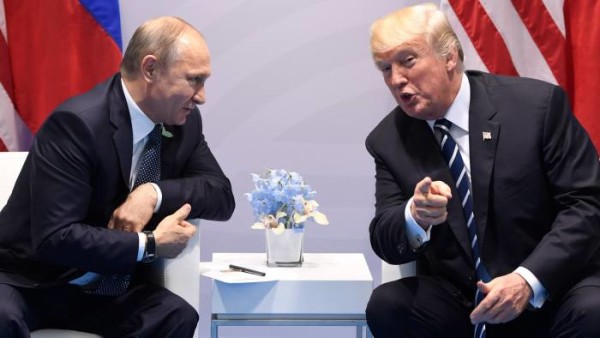Daily briefing: EU ready to retaliate over Russia sanctions, IMF cuts UK and US growth forecasts, Tesla’s moment of truth
Simply sign up to the Global Economy myFT Digest -- delivered directly to your inbox.
Sign up to receive FirstFT by email here
Brussels is preparing to retaliate against the US if Washington pushes ahead with far-reaching new sanctions on Russia that hit European companies. The White House indicated on Sunday that President Donald Trump would accept legislation that would punish Russia for interfering in the 2016 election. Meanwhile, Donald Trump Jr, Jared Kushner and Paul Manafort were scheduled to appear before Senate committees this week. Mr Kushner released a statement on Monday in which he defended his contact with Russians during the presidential campaign as fleeting and innocuous, denying he set up a “secret back channel” with the Kremlin to evade detection.
Brussels fears that efforts to punish Moscow’s election meddling will hurt energy companies. According to a note prepared for a commission meeting on Wednesday, and seen by the Financial Times, Brussels “should stand ready to act within days” if the US measures were “adopted without EU concerns being taken into account”. (FT, NYT, WSJ)

In the news
IMF cuts growth forecasts for UK and US
The IMF has cut its growth forecast for the UK economy this year to 1.7 per cent, citing tepid economic performance and uncertainty over Brexit. The 3 percentage point downgrade was the biggest it made to any of the advanced economies, although it also cut its forecast for the US to 2.1 per cent. The eurozone is expected to outperform the UK economy with 1.9 per cent growth. (FT)
Bank chiefs’ shareholdings soar in value
The men running two of Wall Street’s biggest banks, Goldman Sachs and JPMorgan Chase, saw the value of their shareholdings rise by a combined $314m in 2016 as stock market prices rocketed in the aftermath of Donald Trump’s election. The average gain for the other 18 best-paid chief executives at international banks was $4m. (FT)
GrabTaxi raises $2.5bn
Singapore-based Uber rival, GrabTaxi, is raising $2.5bn in Southeast Asia’s largest ever round of start-up fundraising as it seeks to battle Uber. (WSJ, FT)
Polish president steps in
Poland’s president Andrzej Duda said he would veto two bills which would give politicians wide-ranging powers over the country’s judiciary. The proposed legislation has faced mounting international criticism and sparked protests, with tens of thousands of Poles taking to the streets to protest against the changes which they fear would undermine the independence of the judiciary. (NYT, FT)

Vanguard closes in on BlackRock
The battle is heating up between the world’s largest asset managers. After pulling in more than $1bn a day of investor money since the start of the year, Vanguard is closing in on BlackRock’s top spot. (FT)
World’s first floating wind farm
The revolutionary technology, located off the north-east coast of Scotland, is a trial that will bring power to 20,000 homes. It allows wind power to be harvested in waters too deep for conventional bottom-standing turbines. (BBC)
The day ahead
UN Security Council meets on Jerusalem
The meeting comes as the Arab League said Israel was “playing with fire” over the installation of metal detectors at the Noble Sanctuary-Temple Mount in Jerusalem. At least three Israelis and three Palestinians have died in violence surrounding the installation. (Reuters)
Turkey trial
The first journalists go on trial in connection with last year’s failed coup attempt. The 17 employees of a Turkish opposition newspaper are on trial for allegedly aiding a terrorist organisation, and their sentence could be up to 43 years in jail. (BBC)
Keep up with the important business, economic and political stories in the coming days with the FT’s Week Ahead.
What we’re reading
Shale oil’s subsidised success
The tide of cheap shale oil and gas will recede only when the capital markets stop wiring funds to the producers, says John Dizard, who has talked to international oil people who believe shale producers are the spoiled children of the Federal Reserve, the US central bank and overindulgent investors. (FT)
Tesla’s moment of truth
Tesla chief Elon Musk hopes his Model 3 will be the first mass-market electric car and will set it on the path to profitability. (FT)

Is global inflation merely resting, or will it stay low forever?
A recent paper would seem to suggest that a structural change in labour markets means inflation is likely to stay lower for longer. (FT)
How Dennis the Menace went digital
The Beano, the UK’s longest running comic, was founded in 1938, but is hoping to combat dwindling print sales and stay relevant to the YouTube generation with their “swipey” fingers. (FT)
Norway takes lead with crewless ships
The electricity-powered Yara Birkeland, known as the “Tesla of the Seas”, is due to start sailing fertiliser down a fiord in 2018. The vessel will cost $25m, but without the need for fuel or crew it promises to cut costs by up to 90 per cent. (WSJ)
The Americanisms are coming!
Many Britons suspect that British English is losing a war to the US kind. As American influence on global (not just British) English rises, it is right to dread a “linguistic monoculture”. But it is wrong to think that it is likely. (Economist)
Video of the day
Martin Wolf: where cash still matters
FT chief economics commentator Martin Wolf says digital cashless payments are increasing globally, especially in China, but warns that for some countries, rapid demonetisation can be harmful. (FT)
Comments